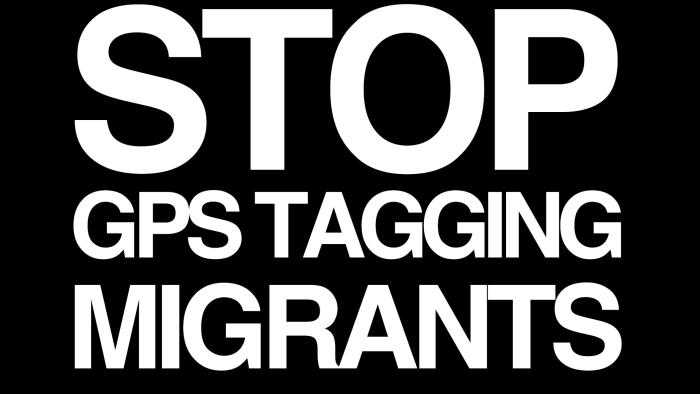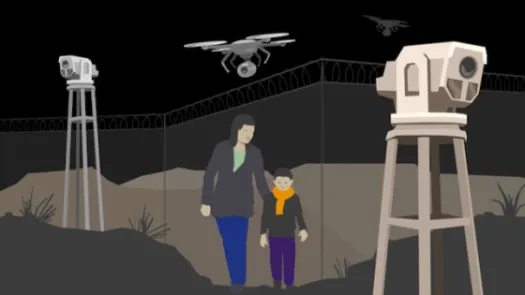Stop GPS tagging migrants
Fighting the GPS tagging of migrants in the UK's 'hostile environment'
Ten years ago, the then Home Secretary, Theresa May, announced a 'hostile environment' strategy to combat what she called 'illegal immigration' in the UK. The aim of the strategy was to deter migrants from entering the UK, or encourage them to leave voluntarily. This was achieved through inhumane and tyrannical practices, including the deployment of surveillance and control measures. It seems as though through the 'hostile environment' policy, migrants are deemed to be undeserving of the same fundamental rights as other individuals.
We've seen an increase in the deployment of cruel and brutal policies such as indefinite detention of migrants. In particular, we've anxiously watched governments around the world move towards the steady creep of data sharing and exploitation targeting migrants.
This drive to track, monitor, target and analyse the data of migrants and asylum seekers is not slowing down. On the contrary, in the UK the 'hostile environment' strategy continues to expand - and to export itself, e.g. through flying out asylum seekers to Rwanda for offshore treatment of their applications. This expansion is exemplified in the roll out of new electronic monitoring tags for migrants, with limited safeguards and oversight. Working with the migration sector, PI is seeking to question and challenge the use of such technologies on migrant and refugee populations.
What's the problem?
The UK Home Office has rolled out GPS ankle tags, a highly punitive surveillance measure. The stated objective of the measure is to prevent migrants from absconding and to monitor their compliance with immigration bail conditions. However, this surveillance and control measure goes far beyond what is necessary to prevent absconding, and shows a seismic shift in the treatment of migrants.
Data collected from GPS tags provides deep insight into and reveals intimate details of an individual’s life. Tags rely on GPS technology, gathering location data 24 hours a day, 7 days a week. Despite the indiscriminate mass nature of this surveillance, there is no provision for judicial or independent oversight at the point where an electronic monitoring condition is imposed by the Home Office.
This seems to be a disproportionate and draconian measure to adopt in light of the fact that in 2020, only 1% of people released from immigration detention tried to abscond.
Of particular concern, the Home Office plan to use location data collected from GPS tags to inform decisions on individuals’ asylum and immigration applications, stating that this will negate the need to request substantiating evidence from third parties. Take a look at your location history over the last year, are you able to account for all of it? This is what migrants will face - life-changing and rights-impacting decisions made on the basis of unreliable data in which the Home Office will place a blind trust. This inevitably leads to a permanent anxiety of going places or making journeys that might later be judged as damaging to their immigration application - thereby further impacting their rights to free expression, movement, assembly and association.
Forcing migrants to wear GPS tags is punitive, intrusive and dehumanising. If you have to wear a tag, you are forfeiting your liberty, and you're now further entangled, and not just figuratively speaking, with the whims, draconian impulses, and technolological incompetence of a perpetually failing government department, and the roll call of outsourcing companies who are just in it for the money.
What are we doing about it?
We are working together with migrant rights organisations to expose and challenge invasive and dehumanising migration control policies and practices in the UK and beyond. We have been investigating the use of GPS tags and challenging this policy by:
- undertaking research to document and explain how GPS technologies work and the implication for their use in the migration sector;
- alerting regulatory bodies, such as the Independent Chief Inspector of Borders and Immigration Inspection, about the Home Office's use of GPS tags as part of its Immigration Bail policy;
- filing complaints with the UK's data protection authority (the ICO) and Forensic Science Regulator
- supporting migrant rights defenders' and immigration lawyers' litigation efforts against the imposition of electronic monitoring conditions on their clients;
- bringing to the attention of international human rights mechanisms, such as the United National Special Rapporteur on the rights of migrants,our concerns about the use of such invasive tactics on migrant and refugee populations;
Beyond the issue of GPS tags, we have recently exposed and successfully challenged the unlawful and secret seizure of mobile phones from asylum seekers arriving by small boats in the UK.
We will continue to expose these hostile policies affecting migrants and will tell the stories of those affected, because everyone should be free to be human.


